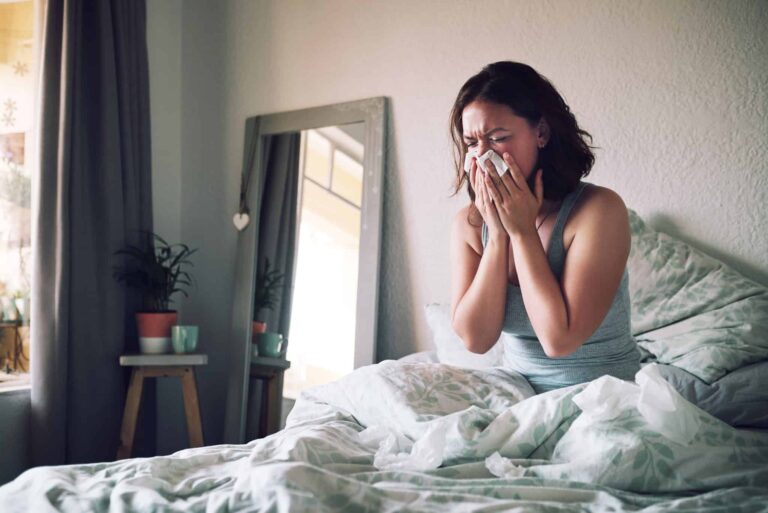Allergies are different for everyone. Some experience year-round allergies, while others deal with seasonal hay fever. Similarly, some people have allergy symptoms throughout the day, while others only have flare-ups in the morning.
If you suffer from morning allergies, let’s take a look at what may be causing your symptoms and what you can do to feel better.
Common Morning Allergy Symptoms

Allergy symptoms occur when your body comes into contact with a harmless trigger (like pollen or pet dander) that your body mistakes as harmful. Symptoms of morning allergies can include:
- Nasal congestion
- Itchy, watery eyes
- Runny nose
- Sneezing
- Postnasal drip
- General fatigue
- Coughing or wheezing
What Causes Allergies In The Morning?
Several allergens can lead to worsening morning symptoms, including:
- Pollen. Pollen counts are highest in the morning. If you tend to experience allergy symptoms when out on a morning walk or run at Fort Palmetto Park, you may have a pollen allergy.
- Dust mites. These microscopic bugs live in homes and often live in mattresses, pillows and other bedding. This leads to an increase in allergy symptoms after waking.
- Mold. Indoor mold can cause morning allergy symptoms, especially if your bedroom is near the bathroom or another area where mold is likely to grow.
- Pet dander. Pet dander, especially if your pets sleep in your bed or bedroom, can be another cause of increased morning allergy symptoms.
Tips For Managing Morning Allergies
Allergies aren’t just an inconvenience; they can impact your quality of life. Research has found that morning allergies have a particularly negative effect on mood. Thankfully, you can take steps to manage your symptoms:
- Keep your windows closed, especially when sleeping.
- Don’t let pets sleep on your bed or in your bedroom.
- Bathe your pets once a week.
- Shower before going to bed to remove any pollen from your hair and body.
- Use a dehumidifier in your room to help kill dust mites.
- Use dust-mite-proof bedding.
- Dust and vacuum once a week.
- If possible, remove carpets and rugs from your bedroom.
- Take an over-the-counter antihistamine before going to bed.
When To See a Specialist
If you can’t manage your allergy symptoms with at-home remedies and find that they are interfering with sleep or other aspects of your life, schedule an appointment with an allergist. They can perform allergy testing to identify your triggers and recommend additional medications or treatments like immunotherapy to stop allergies from interfering with your life.
For more information or to schedule an appointment, call Charleston ENT & Allergy today.
